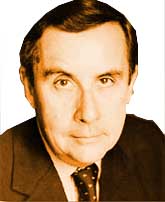|
|
William Pfaff
 Authority rests on a moral position, and requires consent
Authority rests on a moral position, and requires consent
PARIS -- President Bill Clinton's journey to six African countries gave him and the 400 Washingtonians traveling with him a short introduction to African realities, and also a small lesson in the difference between power and authority.
The latter was provided in the little lecture given Mr. Clinton by
Nelson Mandela in Cape Town last Friday. The South African
president, who possesses undoubted authority, politely told Mr.
Clinton that he would accept no instructions from America on
whom South Africa should trade with, or on what its foreign
policy should be. He suggested  that the United States "set an
example to all of us" by talking peace instead of power.
that the United States "set an
example to all of us" by talking peace instead of power.
President Mandela's rebuke followed Mr. Clinton's unsettling experience with another African, UN Secretary General Kofi Annan, just a month ago. Mr. Annan courteously but effectively took control of the Iraq crisis out of American hands and imposed a negotiated solution which most in Washington had not believed possible, and many in the Clinton administration did not want.
Republican Senate Majority Leader Trent Lott said at the time that the administration had "subcontracted" American foreign policy to the UN. Actually, the UN was able to take control because the other members of the Security Council, Britain excepted, opposed the United States on military action.
A former official of the Bush administration, John Bolton, also criticized what happened by saying that the Clinton administration had acted as if the UN "has a life or existence outside of what the U.S. wants it to do." It has, as the Security Council's members demonstrated.
At about the same time, the Pope was weakening administration control of U.S. Cuban policy through his visit to Cuba and condemnation of U.S. sanctions. Washington has since bowed to international opinion and made concessions in its blockade.
U.S.-imposed sanctions on Iran are ignored by other major trading nations. The administration has repeatedly postponed application of the retaliation against foreign companies trading with Iran that Congress has mandated, knowing that to apply penalties would produce a big clash with the European Union.
Benjamin Netanyahu has taken over control of America's Middle Eastern policy by refusing to carry out the promises Israel has made concerning West Bank withdrawals and Jewish colonization of Jerusalem's suburbs.
This has greatly damaged U.S. alliance interests in the region, as Arab reaction to the Iraq crisis demonstrated, but Mr. Clinton can do absolutely nothing about it. Congressional pressure and Democratic Party electoral concerns prevent retaliation against Mr. Netanyahu's policies.
Mr. Mandela also told Mr. Clinton that the administration proposal, now before Congress, to put trade in the place of African development aid is unacceptable. Mr. Clinton has announced augmented aid, but had set out on this trip to promote American private investment in Africa. However the obstacles to investment remain formidable, the most important among them the absence nearly everywhere of stable political structures. Those will come only from the development of a substantial and educated middle class, which as yet hardly exists in sub-Saharan Africa.
There have been imposing African leaders, from the younger Kwame Nkrumah in post-colonial Ghana and the older Jomo Kenyatta in Kenya, to Yoweri Museveni in Uganda today, but the one-party state remains the African norm. Mr. Museveni -- America's current favorite -- was installed by a military coup in 1986.
During his East African stops, President Clinton apologized to Africans for slavery, neglect, indifference to genocide in Rwanda, and for America's past support for dictators and exploitation of Africans in fighting the Cold War.
He did not mention the role of the United States with respect to the Ugandan-supported Tutsi exile force, led by an American-trained officer, Paul Kagame, which in 1994 liberated Rwandan Tutsi survivors from the genocide launched by the Hutu-dominated Rwandan government.
This force took over Rwanda and later attacked the Hutu forces harassing Rwanda from refugee camps in neighboring Zaire. Together with the forces of its Congolese client, Laurent-Desire Kabila, it drove them and the refugee masses accompanying them deep into Zaire, where it seems that it killed nearly all of them -- the final solution to a portion of the Tutsis' Hutu problem, inspired by the earlier effort of the Hutu government in Rwanda to make a final solution to its Tutsi problem.
Even though this eventual outcome was undoubtedly unforeseen and unwanted by Washington, the United States would seem to have been implicated in preparing Mr. Kagame's force, but nothing has been either conceded or reported.
Washington did endorse Mr. Kabila's succession to the man the CIA originally made leader of the Congo (which he renamed as Zaire), the atrocious ``Marshal'' Mobutu. Mr. Kabila refuses to allow international agencies to investigate the fate of the refugee Hutus.
The belief that America as "sole superpower" would or could dominate the world, widely held after Communism's collapse, rested on the illusion that military and economic power directly translate into political power, and that power is identical with authority.
The exercise of authority requires consent, and rests on a moral
position. This is what Mr. Mandela was saying to Mr. Clinton,
and what recent events have
3/29/98:Signs of hope in troubled Russia
3/25/98: National Front amassing power
3/23/98: NATO's expansion contradicts other American policies
3/18/98: The New Yorker sought money, but lost it
3/16/98: America's 'strategy of tension' in Italy
3/13/98: Slobodan Milosevic may have started something that can't be stopped